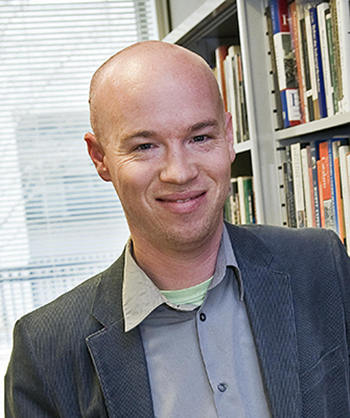
Two professors named fellows at Institute for Advanced Study
join a select group of international scholars
Boston College faculty members Owen Stanwood, a historian of colonial America, the Atlantic world, and early modern global history, and Michael Noone, a Spanish Renaissance music scholar, have been selected for fellowships at the prestigious Institute for Advanced Study, an independent center for theoretical research and intellectual inquiry.
Chosen by the IAS’s permanent faculty through a highly competitive process and based on the preeminence and potential of their research, the new class of 259 post-doctoral scholars—representing 39 nations and more than 108 institutions—will pursue a range of individual and collaborative projects in association with the 48 permanent and emeriti professors during the 2025-2026 academic year.

Professor of History Owen Stanwood (Lee Pellegrini)
Stanwood, a professor of history, is the author of The Empire Reformed: English America in the Age of the Glorious Revolution, which examined how fears of Catholicism galvanized and transformed Anglo-American political culture during the late 17th century. The American Historical Review praised the book as “a fresh interpretation of the Glorious Revolution,” noting that “Stanwood’s masterful research and writing make an invaluable contribution to debate over this ever-intriguing event.”
His second volume, The Global Refuge: Huguenots in the Age of Empire— written during a previous IAS residency—focused on the global diaspora of French Protestant refugees, who scattered after Louis XIV revoked their right to freedom of worship in 1685, and settled in communities extending from South Carolina to South Africa, including the Caribbean and the Indian Ocean, significantly contributing to the development of the British and Dutch empires. The Global Refuge was the first ever in-depth exploration of the Huguenot migration through the 17th and 18th centuries.
Stanwood’s teaching topics range from colonial and revolutionary America to early modern Europe, and include European-Indian relations, the settlement of Boston and New England, the history of Jesuits in North America, and the French Atlantic experience.
“I am beyond honored to be invited to the IAS a second time,” said Stanwood. “It is a singular place for reading, writing, and reflection, and the intellectual community is unmatched. It is also humbling to walk down the same halls as Albert Einstein, anthropologist Clifford Geertz, and all the other famous scientists and scholars who spent time there in the past.”
During his return to IAS, Stanwood will continue work on a book titled The Imagined Continent: Searching for Lost Worlds in Early North America, which focuses on European stories about lost Indigenous cities and civilizations that routinely crossed the continent and the Atlantic Ocean from the time of Columbus to the era of the American Revolution.
.jpg)
Professor of Music Michael Noone (Lee Pellegrini)
Noone, a professor and former Music Department chair, focuses his research on Spanish Renaissance music with a strong emphasis on sacred melodies. Passionate about the interrelationship of music scholarship and performance, he is deeply concerned with the complex questions raised when compositions of the past are performed in the present.
His career has led him to teaching, research, and performance posts at universities in five countries on four continents, including as chair of music at the University of Hong Kong, and of the Austrian National University’s School of Musicology.
Noone’s first book, Music and Musicians at the Escorial Palace under the Habsburgs 1563-1700 was hailed as a “trailblazer” while his second volume, El Códice 25 de la Catedral de Toledo, revealed innovative codicological work that unveiled previously unknown works by leading composers of Spain’s Golden Age. A reviewer wrote that Noone had done a “signal favor for both the community of scholars and performers interested in the glories of Renaissance music.”
Noone has worked closely with Boston College Libraries on a series of digital humanities projects involving some of the rarest sources of sacred music held in the Burns Library. Standing at the intersection of faith, culture, and technology, the digital teaching and research resources to emerge from these projects are designed to be accessible to both specialists and the wider public, he said.
“You don’t need to be a specialist to be deeply moved by Renaissance music. As the current exhibition of Renaissance art in the McMullen Museum of Art proves, this is music and art that speaks to us as freshly today as it did in the past.”
At the IAS, Noone will be writing the first study of Susana Muñoz, an illiterate autodidact who came to dominate the printing of sacred music in Early Modern Spain.
“It is to the agency of this remarkable woman that we in the 21st century can enjoy the works of three of Spain’s greatest composers writing at the dawn of the Baroque,” Noone said, “But more than this, Muñoz established a printing dynasty that served as official academic printer for the universities of Salamanca and Alcalá at a time when this powerful new technology was changing lives through education.”
The Princeton, New Jersey-based IAS, founded in 1930, is dedicated to the support of fundamental research in the sciences and humanities. Among past and present faculty and members, 37 were Nobel Laureates, and many were MacArthur and Guggenheim fellows.
